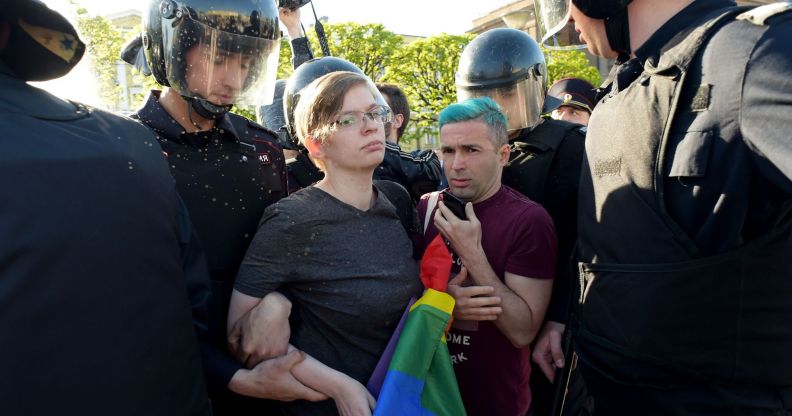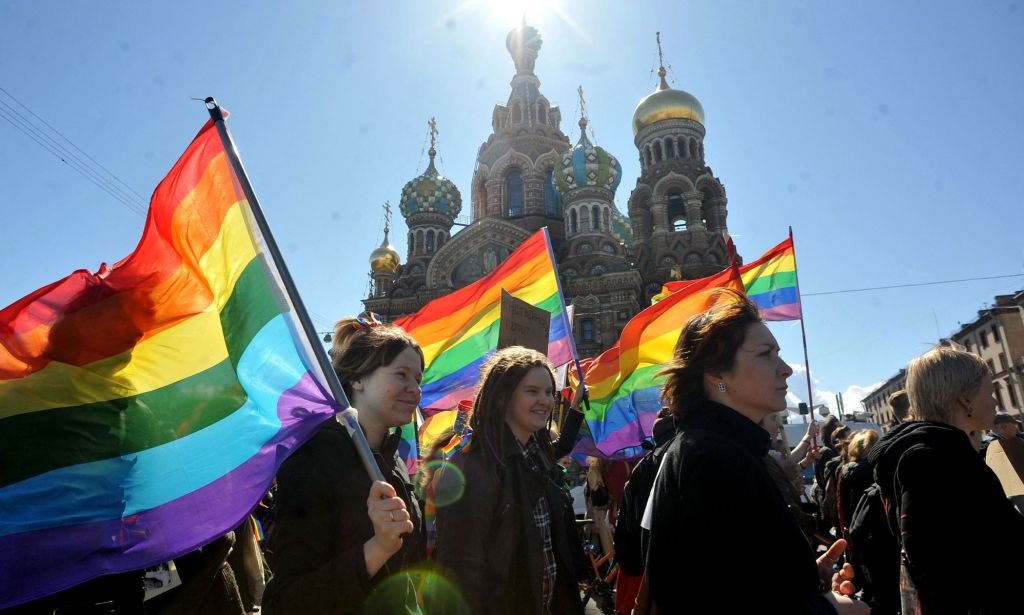Russian police raid gay bars after Supreme Court ruling brands LGBTQ+ movement ‘extremist’

Russian riot police detain LGBTQ+ rights activists during a St Petersburg march. (Getty)
Russian police have begun cracking down on LGBTQ-friendly clubs and venues in Moscow, just days after a Supreme Court ruling branded LGBTQ+ activism “extremist”.
Overnight raids across the Russian capital saw clubs, saunas, bars and more overrun with police officers who checked documents and ID cards of attendees.
The raids were reportedly commissioned under the pretext of searching for drugs, of which there were none found in any of the venues raided.
One of the clubs raided by the police was hosting an LGBTQ-themed night and attended by over 300 people.
Another, an LGBTQ+ sauna, saw masked police officers force attendees to lie on the floor face-down according to witnesses.

The wave of police operations comes just two days after the Supreme Court ruled that a so-called “international public LGBT movement” should be labelled as “extremist”.
The ruling, which was handed down on Thursday (30 November) has left the LGBTQ+ community in Russia in danger of lengthy prison sentences if they are deemed to be part of the movement, which does not exist.
The raids overnight are believed by many to be the beginning of further crackdowns by Russian authorities against the queer community.
Several organisations which serve the LGBTQ+ community have been forced to shut down amid the growing animosity, including St. Petersburg’s Central Station gay club, which announced its closure.
“The site we rented refused to allow us to work because of the [new] law. We apologise, we are no longer in business,” the club shared on social media.
Since at least 2013, Russian authorities have been implementing anti-LGBTQ+ legislation designed to censor and suppress open discussions of the community.
After the much-reviled ‘gay propaganda‘ law was extended to censor LGBTQ+ themes for adults, Russia’s justice ministry filed a request into the so-called “international public LGBT movement” by Russia’s justice ministry.
It argued in a request filed in early November that officials had identified “signs and manifestations” of the nonexistent movement that it believes were of an “extremist nature” and could incite “social and religious discord”.
It provided no evidence of these claims.
Less than a month later, after a behind-closed-doors deliberation, the country’s top court ruled that the vaguely defined movement was “extremist”.
The Human Rights Campaign’s director of global partnerships, Jean Freedberg, said the decision in Russia was “reprehensible” and a display of the “repression in a country where LGBTQ+ people already fear for their lives”.
“The hearing took place in secret, sealed off from public scrutiny and closed to those who wished to speak in defence of LGBTQ+ people,” Freedberg continued. “There is no justice in this decision, there is no justice in governing based on fear.
“There is no justice in a country that is intent on criminalising people on the basis of who they are or who they love.”
How did this story make you feel?

